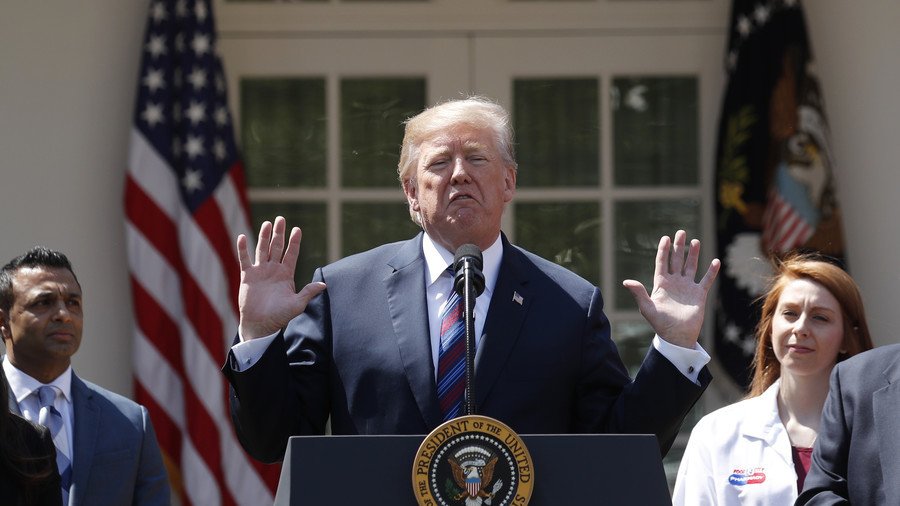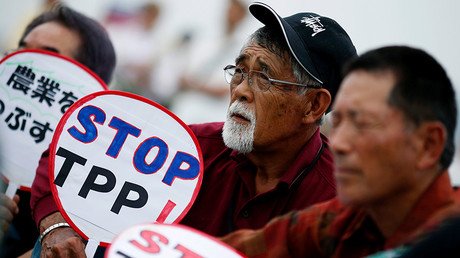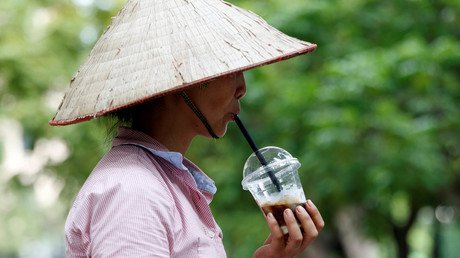The art of the fail: Trump may be forced into embarrassing U-turn on TPP

Donald Trump’s announcement this week that his administration would consider re-entry into the Trans-Pacific Partnership (TPP) trade agreement is seen by many as a token gesture at best and an embarrassing climb-down at worst.
Economist and CEO Michael Pento and Asia-Pacific strategic and economic policy specialist Sourabh Gupta spoke to RT.com about both the motivations behind the potential policy course correction, as well as the potential implications for the future, both on a domestic and international level.
The apparent U-turn in Trump’s stance on the agreement was announced by Republican senators, following a meeting at the White House on Thursday. The president instructed Director of the National Economic Council Larry Kudlow and US Trade Representative Robert Lighthizer to explore options to re-join the deal.
“I think the hiring of Larry Kudlow as head of the National Economic Council there is swaying Trump more towards being a free trader,” said Pento. “Larry is very much for free trade. So he’s pushing Trump back into TPP and keeping him in NAFTA.”
Kudlow, a staunch supporter of tax cuts and deregulation, was hired by Trump to succeed Gary Cohn last month after the former economic adviser resigned. Like the president, Kudlow favors taking a tough line on China, and has said that Beijing deserves its “comeuppance.”
“Although the decision is only to review U.S. re-entry into TPP, the key reason is that after 15 months in office, Donald Trump is realizing that he was too hasty to pull the U.S. out of TPP,” Gupta told RT.com.
#Trump eyeing punitive tariffs on $60bn of Chinese imports, tech – report https://t.co/Ur0pLxAQSu
— RT America (@RT_America) March 14, 2018
Some see the president’s willingness to renegotiate the TPP as an attempt to strengthen links with other economies in the Asia-Pacific region as his administration descends deeper into a trade spat with China. Pento, however, does not see the renegotiation happening anytime soon.
“Trump doesn’t like to do multilateral deals. He likes to do bilateral trade agreements,” Pento said. In addition, he pointed out that: “the constituents that are in TPP don’t want to renegotiate. They’re already in, it’s already done.”
Gupta echoed Pento’s sentiments, agreeing that Trump “dislikes multilateral or large regional deals because they do not allow scope for unilateral enforcement (to be read as unilateral coercion) of his trade partners’ practices.”
“One of the cornerstones of Trump’s campaign is ‘America First’ and he likes to do deals that benefit America. He’s not used to joining another organisation where he doesn’t have complete control. He likes to have control, and I don’t think it’s going to happen,” Pento continued.
Throughout his campaign, Trump repeatedly criticized the TPP agreement. He called it a “horrible” deal, that was “pushed by special interests who want to rape our country.” Immediately after taking office, Trump withdrew the US from the agreement.
Likewise, Trump called the North American Free Trade Agreement (NAFTA) “the worst trade deal ever made.” Renegotiations of the deal, which created the world’s largest free trade area when it came into effect in 1994, are currently ongoing.
“The Democratic Party in the House of Representatives is an anti-trade party, hence any agreement that Trump brings to Congress will have no chance of passage if the House of Representatives is re-captured by the Democrats in November (as seems to be the case),” Gupta said.
EU-US relations are at historic lows because of #Trump's policies - Juncker https://t.co/ODIw8A6OWp
— RT (@RT_com) March 19, 2017
Trump’s opinion on these agreements has not changed, and his U-turn is all bluster, Pento argues.
“This is a very capricious president, and I think he did it to appease the free traders in his cabinet,” Pento added. “But I don’t think he’s interested in an omnibus multilateral trade agreement. He’s not interested in NAFTA or TPP.”
Gupta finished by saying that Trump may have backed himself into a corner, both internationally and domestically. “It has hurt the economic prospects of many of the core constituents of his political base, such as the agricultural community, as well as reduced his leverage in dealing with China.”
“To reiterate, the chances that Trump will rejoin TPP are much less than 50 percent. And the chances that Congress will actually ratify a TPP agreement in the next few years (if the agreement is placed on the Congressional table) is even tinier – perhaps 10-20 percent. Trump might be better off just coercing Japan to forcibly enter into a bilateral deal with the US (and thereby have US preferential trade agreements with all the main TPP countries).”
If you like this story, share it with a friend!














